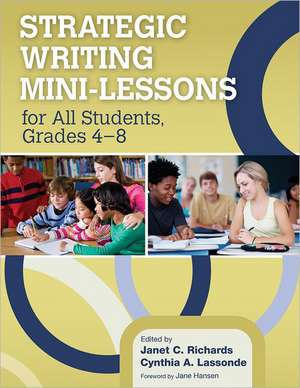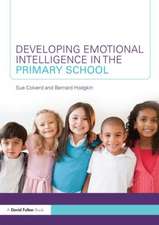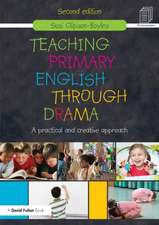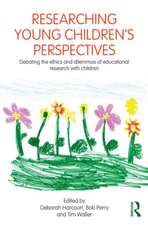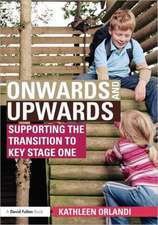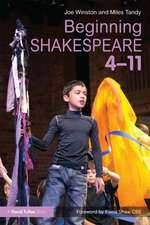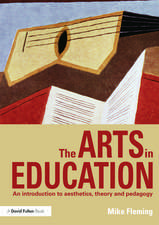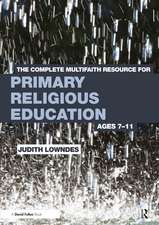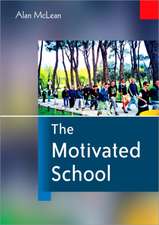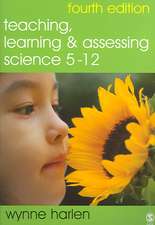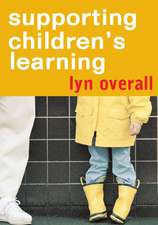Strategic Writing Mini-Lessons for All Students, Grades 4–8
Editat de Janet Richards, Cynthia A. Lassondeen Limba Engleză Paperback – 7 ian 2013
Preț: 321.27 lei
Nou
Puncte Express: 482
Preț estimativ în valută:
61.47€ • 64.36$ • 50.87£
61.47€ • 64.36$ • 50.87£
Carte tipărită la comandă
Livrare economică 07-21 aprilie
Preluare comenzi: 021 569.72.76
Specificații
ISBN-13: 9781452235011
ISBN-10: 1452235015
Pagini: 264
Dimensiuni: 216 x 279 x 20 mm
Greutate: 0.73 kg
Ediția:New.
Editura: SAGE Publications
Colecția Corwin
Locul publicării:Thousand Oaks, United States
ISBN-10: 1452235015
Pagini: 264
Dimensiuni: 216 x 279 x 20 mm
Greutate: 0.73 kg
Ediția:New.
Editura: SAGE Publications
Colecția Corwin
Locul publicării:Thousand Oaks, United States
Recenzii
“Teachers often worry about how to teach writing to students at different levels, especially to students who seem to struggle as writers. With those teachers in mind, this book provides tips about how to tailor instruction.”
“This book is the most useful writing resource I have encountered in all my years of teaching. It is filled with practical strategies to produce writers with high-quality work product and high interest in the craft of writing.”
"A true resource for the teacher of writing. The plethora of strategies is accessible and appropriate for each grade level and learning ability.”
"Great resource! A variety of helpful strategies are offered by teachers in authentic classroom situations. Modifications of these lessons for struggling, ELL, and advanced students enable all to benefit."
“As a Middle School Literacy Specialist with many years of experience in teaching reading and writing, I appreciate this book and highly recommend it as a tool for educators. The authors have compiled the most reliable and best proven practices for teaching writing and made them easily accessible for students’ immediate use. This book not only has tested methods that work for teaching writing, it has modifications for all students, including struggling and advanced writers. Best of all, you’ll discover practical approaches that provide actual mini-lessons with integrated Common Core Standards and ideas to generate purpose for writer motivation. Whether you teach English, Science, Reading, or any other area, your students can benefit from learning the writing strategies in this book.”
“This book is the most useful writing resource I have encountered in all my years of teaching. It is filled with practical strategies to produce writers with high-quality work product and high interest in the craft of writing.”
"A true resource for the teacher of writing. The plethora of strategies is accessible and appropriate for each grade level and learning ability.”
"Great resource! A variety of helpful strategies are offered by teachers in authentic classroom situations. Modifications of these lessons for struggling, ELL, and advanced students enable all to benefit."
“As a Middle School Literacy Specialist with many years of experience in teaching reading and writing, I appreciate this book and highly recommend it as a tool for educators. The authors have compiled the most reliable and best proven practices for teaching writing and made them easily accessible for students’ immediate use. This book not only has tested methods that work for teaching writing, it has modifications for all students, including struggling and advanced writers. Best of all, you’ll discover practical approaches that provide actual mini-lessons with integrated Common Core Standards and ideas to generate purpose for writer motivation. Whether you teach English, Science, Reading, or any other area, your students can benefit from learning the writing strategies in this book.”
Cuprins
Foreword by Jane Hansen
Introduction: Meeting Your Students’ Needs With Specific Writing Strategies by Janet C. Richards, Cynthia A. Lassonde
Section I. Strategic Inventing: Contemplating Ideas
1. Color-Coding Sources by Cynthia A. Lassonde
2. Developing Students’ Awareness of Their Strengths as Writers with an I-Can! Chart by Joanne Durham
3. Using a Blueprint Graphic Organizer to Build a Story by Jennifer A. Fontenot
4. Using Genre Charts to Guide Planning and Writing by Gabe Horn, Susan D. Martin
5. Reciprocal Text Structure Mapping for Expository Writing by Joyce C. Fine
6. Thanks for the Memories! Using a Sensory-Details Chart to Prepare to Write by Sandra Gandy, Mariah Kraus
7. Organizing an Expository Essay: Using Big Idea Checklists to Support Writers by Allison Stone, Joyce C. Fine
Section II. Strategic Drafting: Putting Ideas on Paper
8. Quilting Together an Expository Paper in Four Steps by Cynthia A. Lassonde
9. Team Writing to Foster Students’ Motivation to Write: Moving From Group Work to Independence by Janet C. Richards
10. Use Your Words: Learning to Paraphrase by Janet C. Richards
11. Creating Rounded Characters through Cartoon Connections by Krishna Seunarinesingh
12. Applying the Structure Strategy to Write Persuasive Texts by Bonnie J. F. Meyer, Jennifer Ireland, Melissa Ray
13. Buddies Build It Stronger: A Sentence-Combining Strategy by Todd Sundeen
Section III. Strategic Revising: Attending to Organization and Cohesiveness
14. Deconstruct Then Reconstruct a First Draft by Cynthia A. Lassonde
15. Portal Writing: A Strategy to Help Writers Rethink Their Writing by S. Rebecca Leigh
16. Conferring with an Avatar by Chase Young, Lynda Swanner
17. Writing Aloud: A Sound-Savvy Approach to Writing by Sandra K. Athans
18. A Picture Is Worth a Thousand Words: Revising With Photographs by Noreen S. Moore
Section IV. Strategic Editing: The Finishing Touch
19. Revising and Editing Through Primary Sources by Nancy Williams, Kathleen Muir
20. Code Switching, an Editing Strategy by Rebecca Wheeler
21. The Imagine, Describe, Resolve, and Confrim (IDRC) Strategy by Lindsay Sheronick Yearta, Katie Stover, Lynne Newton, Karen Wood
22. Probable Passages: Using Story Structure to Write and Revise a Predictive Passage by Katie Stover, Jean Vintinner, Crystal Glover, Karen Wood
References
Index
About the Authors
About the Contributors
Introduction: Meeting Your Students’ Needs With Specific Writing Strategies by Janet C. Richards, Cynthia A. Lassonde
Section I. Strategic Inventing: Contemplating Ideas
1. Color-Coding Sources by Cynthia A. Lassonde
2. Developing Students’ Awareness of Their Strengths as Writers with an I-Can! Chart by Joanne Durham
3. Using a Blueprint Graphic Organizer to Build a Story by Jennifer A. Fontenot
4. Using Genre Charts to Guide Planning and Writing by Gabe Horn, Susan D. Martin
5. Reciprocal Text Structure Mapping for Expository Writing by Joyce C. Fine
6. Thanks for the Memories! Using a Sensory-Details Chart to Prepare to Write by Sandra Gandy, Mariah Kraus
7. Organizing an Expository Essay: Using Big Idea Checklists to Support Writers by Allison Stone, Joyce C. Fine
Section II. Strategic Drafting: Putting Ideas on Paper
8. Quilting Together an Expository Paper in Four Steps by Cynthia A. Lassonde
9. Team Writing to Foster Students’ Motivation to Write: Moving From Group Work to Independence by Janet C. Richards
10. Use Your Words: Learning to Paraphrase by Janet C. Richards
11. Creating Rounded Characters through Cartoon Connections by Krishna Seunarinesingh
12. Applying the Structure Strategy to Write Persuasive Texts by Bonnie J. F. Meyer, Jennifer Ireland, Melissa Ray
13. Buddies Build It Stronger: A Sentence-Combining Strategy by Todd Sundeen
Section III. Strategic Revising: Attending to Organization and Cohesiveness
14. Deconstruct Then Reconstruct a First Draft by Cynthia A. Lassonde
15. Portal Writing: A Strategy to Help Writers Rethink Their Writing by S. Rebecca Leigh
16. Conferring with an Avatar by Chase Young, Lynda Swanner
17. Writing Aloud: A Sound-Savvy Approach to Writing by Sandra K. Athans
18. A Picture Is Worth a Thousand Words: Revising With Photographs by Noreen S. Moore
Section IV. Strategic Editing: The Finishing Touch
19. Revising and Editing Through Primary Sources by Nancy Williams, Kathleen Muir
20. Code Switching, an Editing Strategy by Rebecca Wheeler
21. The Imagine, Describe, Resolve, and Confrim (IDRC) Strategy by Lindsay Sheronick Yearta, Katie Stover, Lynne Newton, Karen Wood
22. Probable Passages: Using Story Structure to Write and Revise a Predictive Passage by Katie Stover, Jean Vintinner, Crystal Glover, Karen Wood
References
Index
About the Authors
About the Contributors
Descriere
This full toolbox of creative mini-lessons helps your students build fundamental writing skills, and includes adaptations that reach all your learners through differentiated instruction.
